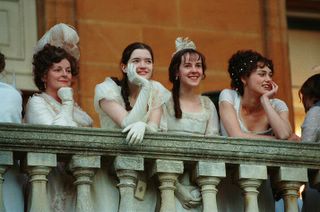Pride and Prejudice
It's kind of difficult to review a literary adaptation like this if you haven't read the source material. Alas, my only experience with Jane Austen has been Northanger Abbey, and it's a rather atypical Austen novel at that. So don't look to this review for a critique of what was left out in the translation to cinema. Certainly, many crucial scenes were removed to make this 120 minute adaptation possible, as it's kind of a long book and previously inspired a 5-hour BBC miniseries.
However, I can say that, serving as my lone experience with this particular story, Pride and Prejudice serves as a well-made, wholly satisfying entertainment. A more realistic, lived-in take on English manor life than we are typically provided, Joe Wright's film delicately balances a modern perspective and attitude with the book's Late 17th Century setting.
Counter-intuitively, the facet of Wright's film I enjoyed the least has been its most touted feature - the lead performance of Keira Knightley as Elizabeth Bennett. Attentive blog readers will note that I have not been Ms. Knightley's biggest fan in the past, attacking her performance as Domino Harvey in Tony Scott's latest nightmare-film only last week. She's not as painfully self-aware and dull here as in Domino, but she hardly radiates the sly intelligence we're told to associate with Miss Elizabeth. In fact, I found her bubbly, toothy performance rather at odds with the way other characters tended to describe and treat Elizabeth. Rather than headstrong and willful, she seems almost disintereted, even childish. That is, until the film's busy conclusion forces her to become more passionate and excitable.
For those as Austen-ignorant as myself, here's a brief and mostly painless plot synopsis, one that's woefully incomplete because the film's narrative takes so many twists and turns. The Bennetts have five daughters, each of whom has arrived or is approaching marrying age. While Mr. Bennett (a charmingly mangy Donald Sutherland) tries to avoid worrying about finances, his wife (Brenda Blethyn) has made it her life's work to find all her girls suitable men.
They all must find well-off husbands, because their father's estate will pass not to any of them, but to the mainly undesirable parson Mr. Collins (Tom Hollander). But there's even more pressure - to avoid unpleasant gossip, the girls should be married off in order by age, starting with the eldest, Jane (Rosamund Pike). And to make matters even more stressful for the Bennetts, the headstrong second-eldest Elizabeth (Knightley) can't be bothered with the affections of Mr. Collins nor the aloof Mr. Darcy (Matthew Macfadyen) nor anyone else for that matter.
Of course, complications pile upon complications, and misunderstandings upon misunderstandings, until it seems that no one will find happiness or financial security. And, this being an Austen novel, everything mainly finds a way to work itself out. Despite all the chaos in the Bennett home, and the juggling of several story arcs, Wright ably keeps the film focused on Elizabeth and her conflicted desires for independence and the safety of commitment.
To do this, he clearly had to remove a lot of material. I didn't even know the story, but even I could tell that major events were glossed over, particularly as they concern the rakish Mr. Wickham (Rupert Friend), who briefly woos Elizabeth before setting his sights on her younger sister Lydia (American actress Jena Malone). Wright sometimes muddles the story's chronology; some of the time jumps aren't clearly indicated. In more than one scene, it would take a few moments before I'd realize the characters had been apart for months.
For the most part, though, Wright and screenwriter Deborah Moggach (with rumored help from Emma Thompson) and cinematographer Roman Osin navigate the complicated world of Austen's novel swimmingly. In one amazing, complex shot, reminiscent in some ways of Max Ophuls' work, Osin's camera swirls around a party, in and out of ballrooms and even doorways, taking in at least three or four conversations at a time.
Osin's photography likewise captures some of the gritty reality of the period that other costume dramas would be tempted to leave out. The Bennetts' modest lifestyle means messy, unwashed hair, boiled potatoes for dinner and muddy feet following walks in the rain. All of these little bits of detail are brought to vivid life in the film, which pretty much looks good enough overall to make me generally unconcerned about its flaws.
Austen's writing essentially created the mold from which all subsequent romantic comedy is formed, so the conclusion to Pride and Prejudice is essentially inevitable from Page One. To Wright's credit, his adaptation doesn't limp familiarly along towards this inevitability, but seems to stumble upon a happy ending by a lucky turn of fate. It's one of the most easy-to-watch, entertaining Austen films I can think of, and the liveliest Hollywood costume drama I've seen in a while.

No comments:
Post a Comment